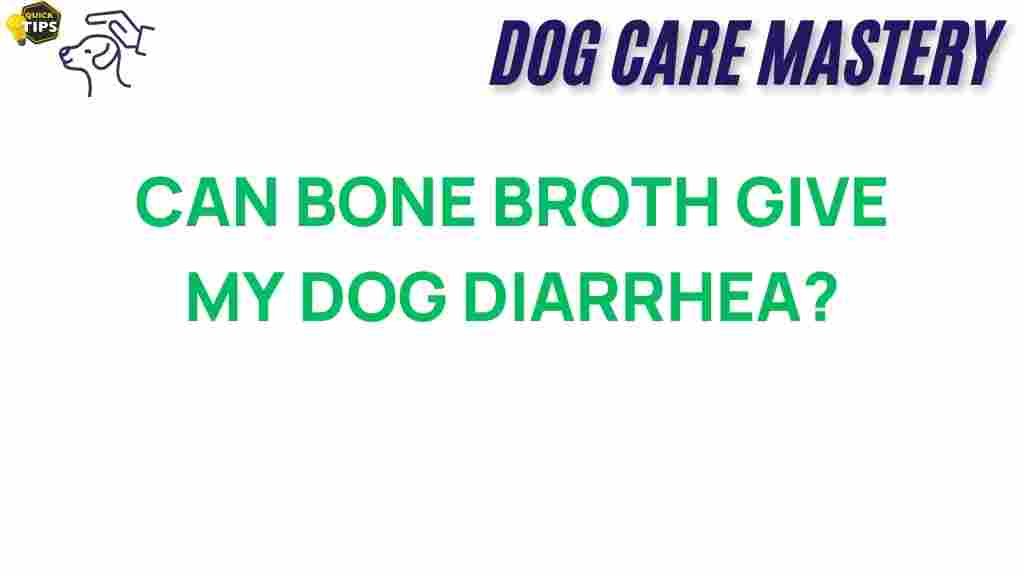Can Bone Broth Cause Diarrhea in Dogs?
Bone broth has gained popularity among pet owners as a nutritious supplement for dogs. Rich in collagen, minerals, and amino acids, it offers various health benefits, including improved joint health and digestion. However, concerns arise regarding whether bone broth can cause diarrhea in dogs. In this article, we will unpack the truth about bone broth, its potential effects on canine digestion, and how to safely incorporate it into your dog’s diet.
Understanding Bone Broth
Bone broth is made by simmering animal bones, connective tissues, and sometimes vegetables in water for an extended period. This process extracts nutrients and flavors, resulting in a rich, nourishing liquid. Common ingredients include:
- Beef bones
- Pork bones
- Chicken bones
- Vegetables (like carrots, celery, and onions)
- Herbs and spices (optional)
Bone broth is often recommended for dogs due to its high gelatin content, which can support gut health and improve overall well-being. However, it’s essential to understand how it may affect your dog’s digestive system.
The Nutritional Benefits of Bone Broth for Dogs
Bone broth is packed with nutrients that can benefit your dog’s health:
- Collagen: Supports joint health and reduces inflammation.
- Gelatin: Aids in digestion and helps heal the gut lining.
- Amino Acids: Essential for muscle repair and overall health.
- Minerals: Including calcium, magnesium, and phosphorus, which are vital for bone health.
Can Bone Broth Cause Diarrhea in Dogs?
While bone broth is generally safe and beneficial for most dogs, there are instances where it may lead to digestive upset, including diarrhea. Understanding the potential causes can help pet owners make informed decisions about adding bone broth to their dog’s diet.
Reasons Why Bone Broth May Cause Diarrhea
Here are several factors that can contribute to diarrhea in dogs after consuming bone broth:
- High Fat Content: Some bone broths, especially those made from fatty cuts of meat, can be high in fat. Sudden increases in fat intake can upset your dog’s digestive system.
- Food Sensitivities: Dogs can have sensitivities to certain ingredients, including meat types or vegetables used in the broth.
- Overconsumption: Introducing bone broth too quickly or in large amounts can overwhelm your dog’s digestive system.
- Added Ingredients: Ingredients like onions and garlic, which are toxic to dogs, can also be present in homemade broths.
How to Safely Introduce Bone Broth to Your Dog’s Diet
To minimize the risk of diarrhea and ensure your dog benefits from bone broth, follow these steps:
1. Choose the Right Type of Bone Broth
Make sure to select a bone broth that is:
- Free of harmful ingredients (like onions and garlic).
- Low in fat, especially if your dog has a sensitive stomach.
- Prepared from high-quality bones and meat.
2. Start Slow
Introduce bone broth gradually into your dog’s diet. Begin with a small amount, such as:
- 1 teaspoon for small dogs
- 1 tablespoon for medium dogs
- 2 tablespoons for large dogs
Observe how your dog reacts over the next 24-48 hours. If there are no signs of digestive upset, you can slowly increase the amount.
3. Monitor Your Dog’s Reaction
Watch for any signs of gastrointestinal distress, including:
- Diarrhea
- Vomiting
- Loss of appetite
If your dog exhibits any of these symptoms, reduce the amount of bone broth or discontinue it altogether and consult your veterinarian.
Troubleshooting Tips for Diarrhea After Bone Broth Consumption
If your dog experiences diarrhea after consuming bone broth, here are some troubleshooting tips:
1. Eliminate Other Dietary Changes
Check if you recently introduced other new foods or treats. Sometimes, the cause of diarrhea may not be the bone broth itself, but a combination of dietary changes.
2. Adjust the Portion Size
Reduce the amount of bone broth you give to your dog. If it’s a larger serving size, cut it back to see if the diarrhea resolves.
3. Evaluate the Ingredients
If you’re making homemade bone broth, reconsider the ingredients. Ensure they are safe and suitable for dogs. Avoid any toxic ingredients and consider using leaner cuts of meat.
4. Consider Your Dog’s Health
Some dogs may have underlying health issues that make them more prone to digestive upset. Conditions like pancreatitis, food allergies, or gastrointestinal disorders can lead to increased sensitivity. Consult your veterinarian if you suspect this may be the case.
When to Consult a Veterinarian
If your dog experiences persistent diarrhea, lethargy, or vomiting after consuming bone broth, it’s crucial to seek veterinary advice. A veterinarian can help determine if the bone broth or another underlying condition is causing the issue.
Conclusion
Bone broth can be a nutritious addition to your dog’s diet, offering various health benefits. However, it’s essential to introduce it carefully and monitor your dog’s reaction. While bone broth can cause diarrhea in some dogs, understanding the factors at play and taking precautions can help ensure a positive experience for both you and your furry friend.
For more information on dog nutrition and health, visit this resource. And if you’re interested in recipes or tips on making your own dog-friendly bone broth, explore this guide!
This article is in the category Nutrition and created by dogcaremastery Team
